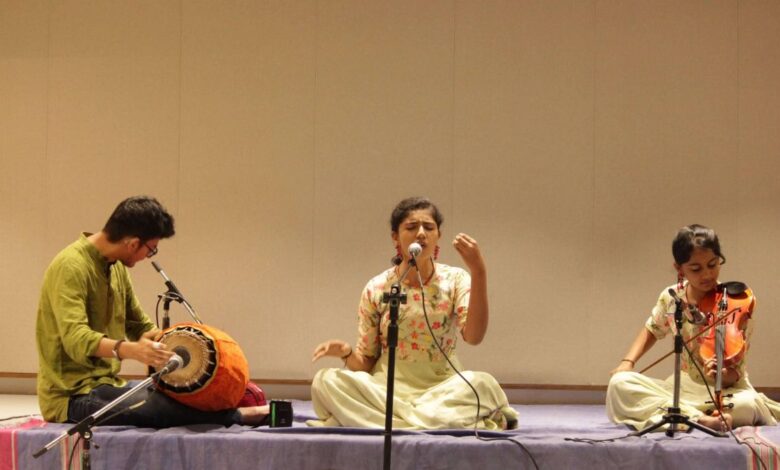Things to Know About Carnatic Music and Vocals

Carnatic music is a traditional form of Indian classical music that originated in South India, primarily encompassing the states of Andhra Pradesh, Karnataka, Kerala, Tamil Nadu, and Telangana. Renowned for its intricate melodies and complex rhythms, this music genre has earned worldwide recognition, and the vocalists are upheld with great respect and honor. Carnatic vocal music can be an enriching experience, offering a deep connection to a rich cultural heritage. The online Carnatic vocal classes offered by top academies like BMusician will connect you to your classical roots and elevate your vocal skills so you can sing any genre flawlessly. Carnatic music is the best form of vocal training that will help build a strong foundation for you as a singer.
This guide will walk you through the basics of Carnatic vocal music, highlighting essential concepts and tips for beginners interested in starting their journey through Carnatic vocal classes.
H2: Understanding Indian Classical Music Through Carnatic Vocal Classes
Carnatic music is one of the two main genres of Indian classical music, the other being Hindustani music from North India. While both share similar foundations, they have distinct characteristics and traditions.
Key Components
Raga: A raga is a melodic framework consisting of specific notes and phrases that convey a particular mood or emotion. There are hundreds of ragas in Carnatic music, each with its own unique structure and emotional essence.
Tala: Tala refers to the rhythmic cycle in Carnatic music. It is a time measure or cycle that defines the rhythm and beat structure. There are numerous talas, each with varying lengths and complexities.
Shruti: Shruti is the musical pitch or tonic note. It serves as the reference point for all the notes sung or played in a composition.
Swara: Swaras are the musical notes. There are seven basic swaras (Sa, Ri, Ga, Ma, Pa, Dha, Ni) in Carnatic music, similar to the Western Do-Re-Mi scale.
H3: Let’s Get Started with Carnatic Vocal Classes
Online Carnatic vocal music classes unlock endless opportunities for students like you to master this expressive form of classical music and scale their careers in the industry.
Whether opting for traditional in-person lessons or the flexibility of online learning, the key is to find the right resources and create an effective practice routine.
Here’s a guide that will walk you through the initial steps to kickstart your Carnatic vocals.
Finding the Right Carnatic Vocal Classes
Whether you’re looking for traditional in-person classes or the convenience of online learning, finding the right Carnatic vocal classes is crucial.
Carnatic Vocal Online Classes
Online Carnatic vocal classes have become increasingly popular due to their accessibility and flexibility. Here are some tips to find the best online Carnatic vocal classes:
Research: Look for reputable platforms and instructors. Online academies like BMusician offer comprehensive online Carnatic vocal music classes.
Trial Classes: Many platforms offer trial lessons. Take advantage of these to evaluate the teaching style and curriculum.
Reviews and Testimonials: Check reviews and testimonials from other students to get an idea of the quality of instruction and overall experience.
H4: How to Set Up for Online Carnatic Vocal Classes
To make the most of your online Carnatic music vocal classes, you must create a conducive learning environment. Here are a few tips to remember when starting your online music education journey.
Technology: Ensure you have a reliable internet connection, a computer or tablet with a good camera and microphone, and quality headphones.
Learning Space: Choose a quiet, comfortable space free from distractions. Having a dedicated practice area can enhance focus and consistency.
Materials: Keep a notebook for taking notes, a shruti box or app for maintaining pitch, and any recommended textbooks or resources provided by your instructor.
H5: Basics of Carnatic Vocal Music for Beginners
When you start your lessons on Carnatic vocal music, you should begin by learning the fundamentals of the genre. This involves understanding critical concepts like raga and tala and establishing a consistent practice routine. These foundational elements are crucial for building your skills and developing a solid grasp of this classical art form. This section
provides essential guidance to help beginners navigate their initial steps in Carnatic vocal music.
- Fundamental Exercises
Beginners in Carnatic vocal classes typically start with foundational exercises that help in understanding and mastering the basics:
Sarali Varisai: These are simple scale exercises that introduce the basic swaras and help in voice training and control.
Janta Varisai: These exercises involve singing double notes, which aids in developing voice modulation and strength.
Datu Varisai: These are skip-note exercises that enhance agility and precision in singing.
Alankaras: Patterns set to different talas, these exercises help in understanding rhythmic structures and maintaining tempo.
- Understanding Raga and Tala
Learning Ragas: Start with simple and well-known ragas such as Shankarabharanam, Mohanam, and Kalyani. These ragas have straightforward structures and are easy to grasp for beginners.
Tala Practice: Begin with simple talas like Adi Tala (8 beats) and Rupaka Tala (6 beats). Practice clapping and reciting these talas to internalize the rhythm.
Practice Routine: Consistency is key in mastering Carnatic music. Here’s a suggested
practice routine for beginners:
Warm-Up: Start with breathing exercises and basic vocal warm-ups to prepare your voice.
Shruti Practice: Spend a few minutes aligning your voice with the shruti. This helps in maintaining pitch accuracy.
Swara Exercises: Dedicate 20-30 minutes to practicing Sarali Varisai, Janta Varisai, and Alankaras. Focus on clarity, speed, and precision.
Raga Practice: Spend time practicing simple ragas. Sing the ascending (Arohanam) and descending (Avarohanam) scales, and practice basic phrases.
Tala Practice: Clap and recite talas to build a strong sense of rhythm.
H6: How to Enhance Your Learning Experience
Enhancing your learning experience in Carnatic vocal lessons involves leveraging supplementary resources, seeking regular feedback from instructors, and actively participating in performance opportunities. By incorporating these strategies, students can deepen their understanding, refine their skills, and achieve greater proficiency in this classical tradition. This section offers valuable insights to enrich your journey in Carnatic vocal music.
- Regular Feedback and Practice
One of the advantages of online Carnatic vocal classes is the ability to receive regular feedback from your instructor. Record your practice sessions and share them with your teacher for detailed feedback. This helps in identifying areas for improvement and refining your technique.
- Supplementary Resources
In addition to your Carnatic vocal classes, utilizing supplementary resources can enhance your learning experience:
Class Recordings: Online academies like BMusician provide class recordings and other study materials for students to further their skills in Carnatic music and vocal learning.
Performance Opportunities: Participating in virtual recitals or community music groups can boost confidence and provide practical experience. Some academies, like BMusician, allow students to showcase their talents on global platforms alongside their mentors and develop their confidence as stage performers.
Connect with Fellow Students: Join online forums or social media groups where you can interact with fellow students, share experiences, and learn from each other.
H7: Conclusion
Carnatic vocal music is a beautiful and complex art form that offers a profound musical journey. By enrolling in Carnatic vocal classes, whether in-person or online, and committing to a consistent practice routine, you can build a strong foundation in this classical tradition. Utilize the wealth of resources available through online Carnatic vocal classes, seek regular feedback, and stay motivated by setting goals and engaging with the music community. With dedication and passion, you can master the basics of Carnatic vocal music and embark on a lifelong journey of musical discovery and expression.




